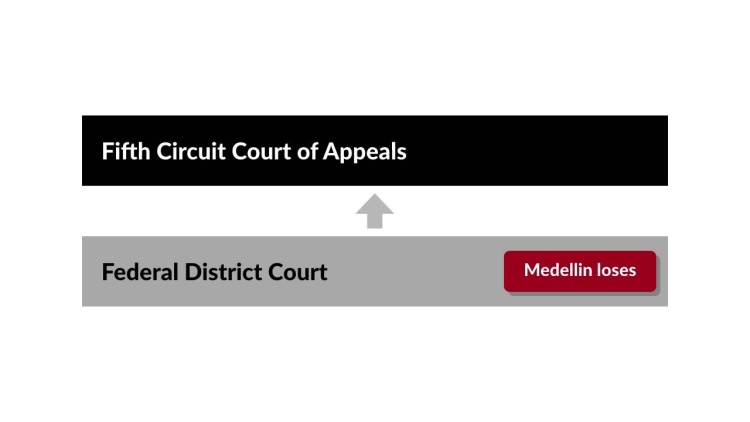Medellín v. Texas
United States Supreme Court
552 U.S. 491 (2008)
- Written by Megan Petersen, JD
Facts
Jose Medellín (defendant) had been sentenced to death for a murder in Texas (plaintiff). The United States was a party to the Vienna Convention on Consular Relations (convention) and the Optional Protocol Concerning the Compulsory Settlement of Disputes to the Vienna Convention (protocol). The convention gave accused foreign nationals in the United States the right to contact their consulates. The protocol gave jurisdiction over disputes about the convention to the International Court of Justice (ICJ). Medellín petitioned a Texas court for habeas corpus on the ground that he was never notified of his rights under the convention. The state courts concluded that Medellín’s claim was procedurally barred for failure to raise it in earlier appeals and that the convention violations had no effect on the outcome. Medellín then petitioned for habeas corpus in federal court, which held that the claim was procedurally barred and concluded no prejudice had occurred. Medellín applied for certification to appeal to the circuit court. The ICJ then ruled in the Case Concerning Avena and Other Mexican Nationals, 2004 I.C.J. 12 (Judgment of Mar. 31), that 51 Mexican nationals, including Medellín, were entitled to have their convictions reviewed due to convention violations, regardless of state procedural-default rules. The circuit court refused to allow Medellín’s appeal, concluding that the convention did not confer individual rights and reaffirming that procedural-default rules applied to convention claims. President George W. Bush then issued a memorandum stating that the United States would comply with its obligations under Avena by having state courts effectuate the decision. Based on this, Medellín again petitioned for habeas corpus in state court. The Texas court denied Medellín’s petition, and the appellate court concluded that neither Avena nor the president’s memorandum was binding. Medellín petitioned the United States Supreme Court for certiorari, which was granted.
Rule of Law
Issue
Holding and Reasoning (Roberts, C.J.)
Concurrence (Stevens, J.)
Dissent (Breyer, J.)
What to do next…
Here's why 907,000 law students have relied on our case briefs:
- Written by law professors and practitioners, not other law students. 47,100 briefs, keyed to 996 casebooks. Top-notch customer support.
- The right amount of information, includes the facts, issues, rule of law, holding and reasoning, and any concurrences and dissents.
- Access in your classes, works on your mobile and tablet. Massive library of related video lessons and high quality multiple-choice questions.
- Easy to use, uniform format for every case brief. Written in plain English, not in legalese. Our briefs summarize and simplify; they don’t just repeat the court’s language.





